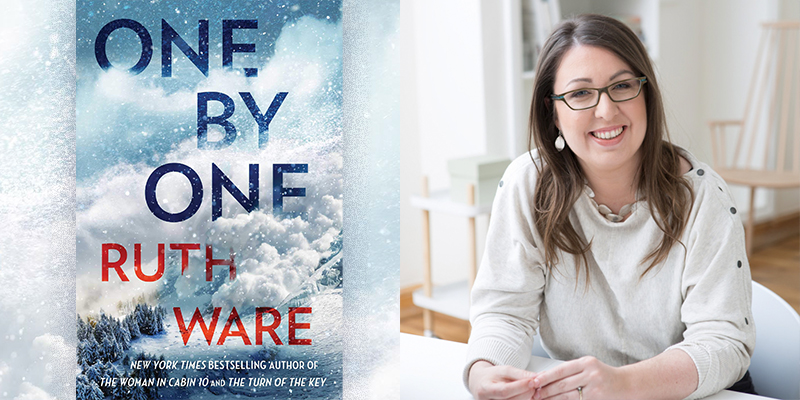I’ve been a huge fan of Ruth Ware’s clever thrillers since her debut, In a Dark, Dark Wood, and while the cover design was what first roped me in, it was Ware’s writing that’s kept me coming back to devour each new adventure as soon at it hits the shelves. (Well, to be honest, quite aways before they hit the shelves—this industry does have its perks!) Ruth Ware’s signature blend of mystery and suspense finds a happy home in whatever setting she chooses, and her latest, One by One, takes us into a snowed-in ski chalet where a group of tech company tourists are dropping dead on the slopes. One by One combines a thrilling, high-stakes setting with an homage to Christie and a biting satire of the tech industry, for another excellent read from one of the genre’s fastest-rising stars. I caught up with Ware over email to discuss her latest mystery, her take on craft, and her thoughts on genre.
 Molly Odintz: Your latest joins a long tradition of harrowing adventures on the ski slopes—were you influenced by any particular books or films?
Molly Odintz: Your latest joins a long tradition of harrowing adventures on the ski slopes—were you influenced by any particular books or films?
Ruth Ware: I actually don’t think I’ve ever read a book set on the ski slopes, which makes me feel very out of touch! I have read a mystery featuring skis as part of the solution, but I won’t say which one as it’s a fairly major spoiler. I think snow is a fantastic natural setting for a thriller though—there is something about the way it looks so beautiful, the way it instantly changes a landscape overnight and makes it so picturesque—and yet it transforms totally ordinary, everyday places into potentially fatal traps. A tranquil country road can become an icy death trap. A routine mountain hike can end with someone hypothermic and fighting for their life. You can even break your neck on your own front porch. Anyone who has been out on the slopes when a whiteout blizzard descends knows how intensely disorientating and terrifying it can be—and how quickly the weather can change from tranquil to treacherous.
MO: Are you a skier?
RW: Yes, but strictly recreational and middle-of-the-road. I am in no way expert.
MO: I loved the app idea in the book and I really wish I could download it. What’s the genesis for the idea?
RW: Well, I knew I wanted the company that hired the chalet to be a dot com start up, and so obviously that entailed thinking up an app, which, let me tell you, is surprisingly hard. I spent a good week brainstorming ideas and then googling, only to find someone else had got there first. I thought music would be a fun way to explore the characters, and also it seemed to lend itself to a certain amount of hip pretension on the part of the app’s founders, which I thought would be entertaining to write about. And I loved the idea of voyeurism—the amount of information we give to our apps, what they see of us, and what they allow us to see. All those people snooping their neighbor’s houses via property websites, or exploring strange neighborhoods with google earth, or stalking exes via social media. So in the end those coalesced into Snoop—an app which allows you to snoop on the listening habits of its users, both random stranger and celebrities—the quid pro quo being that in order to snoop others, you must make your own listening public too. Snoop promises “voyeurism for your ears” which seemed to tick all the boxes.
MO: This is your third crime book to feature people trapped together in a difficult-to-escape scenario. What draws you to the locked room/isolation mystery?
RW: I have no idea—probably some claustrophobic fear of my own! But there’s no denying locked room mysteries are fun to write. The thing is, when you create a locked room mystery, you put severe constraints on the way the book plays out. You have only the characters and equipment you give yourself at the beginning of the story to resolve the situation, you can’t parachute in a convenient doctor to diagnose the cause of death, or a fingerprint expert to identify who last held the weapon. And I firmly believe that as a writer, any constraints you put on your writing forces you to get more creative with what you do have at your disposal.
MO: Your works straddle the gap between traditional mystery and psychological thriller, in a way that feels like a fresh reinvention of both. How would you describe your style?
RW: I think that’s perfect actually! I do have the feeling that bookshops and libraries never quite know whether I belong in the crime or psychological thriller section, because my books have elements of both. On my own website, where I am free to coin new marketing categories, I describe myself as a writer of psychological crime thrillers, which is having my cake and eating it.
MO: It occurs to me that the way you write locked room thrillers is a bit like how the character Abed describes bottle episodes: “wall to wall nuance and facial expressions.” You use your claustrophobic situations to tease out each character’s complexities, in a manner that recalls the notion that we are only ourselves in opposition to others. What’s your take on weaving human psychology into a mystery novel?
RW: To my shame, I’ve never watched Community so I should probably put that right! However, I guess yes, locked room mysteries are in a way the novelistic equivalent of a bottle episode, albeit one spread over a much longer time frame, and they do allow the writer to spend much more time delving into character, because the background remains constant and the characters themselves cannot physically move, so we measure our journey through the plot in terms of their character arc. Crime and psychology are inseparable really—as readers, we have to understand why someone would do something as extreme as killing another person, something that’s totally foreign to most of us, no matter what the stakes. For the novel to work, we readers have to be persuaded that that’s plausible, and in their character, without that aspect sticking out like a sore thumb from page one.
MO: You’ve rapidly gained a number of enthusiastic fans. What was the experience like, to become a household name to mystery readers so quickly?
RW: Amazing! I still have to pinch myself when I go into bookshops and find my books casually lying on a table next to people like John Grisham and Tana French.
MO: If you were to use one word to describe your pandemic, it would be….
RW: Netflix.
***

















